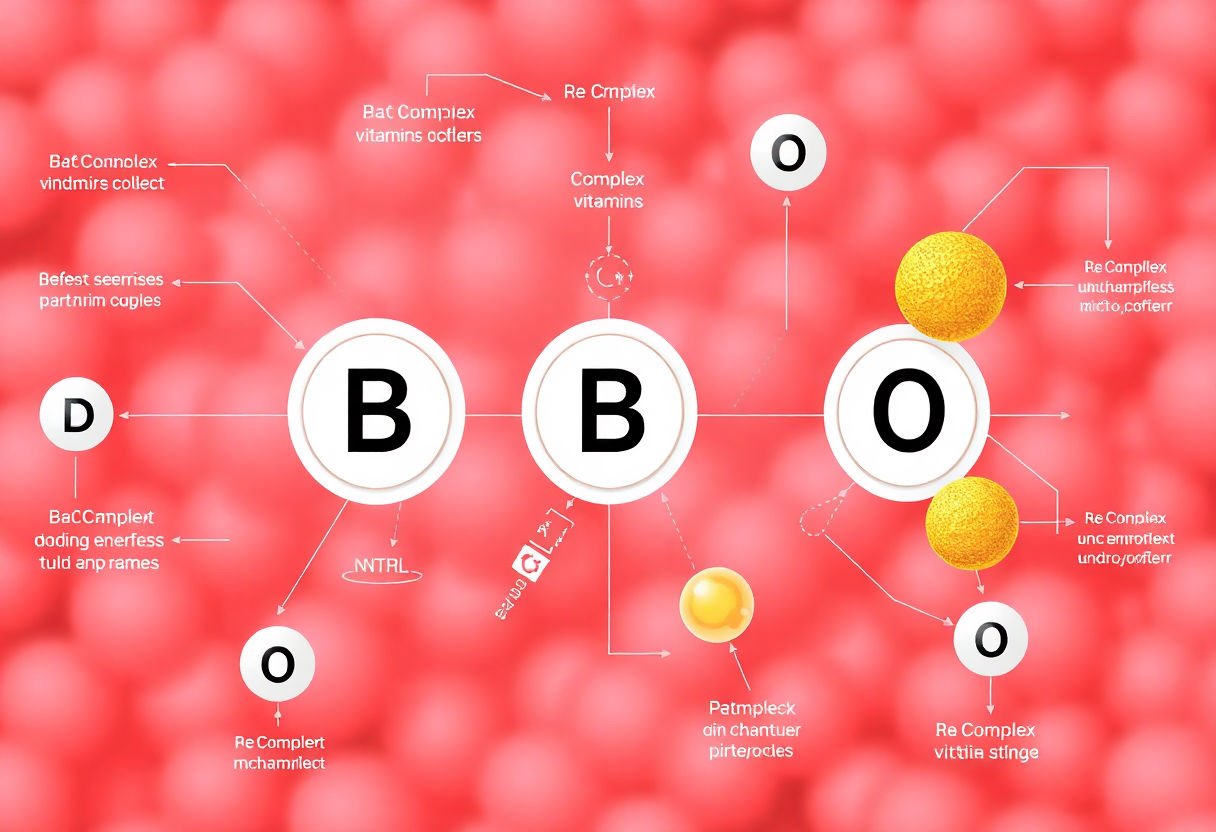B complex vitamins are essential nutrients that play a crucial role in enhancing your child’s energy levels and overall health. These vitamins are vital for supporting growth, development, and maintaining a robust immune system. Understanding how B vitamins contribute to energy production and their importance in your child’s diet can help improve their daily performance and well-being. With practical tips on integrating these vitamins into everyday meals, this article explores the benefits, dietary sources, and safety considerations of B complex vitamins, equipping you with the knowledge to optimize your child’s health effectively.
Key Takeaways
- B complex vitamins are vital for children’s growth, supporting energy production and enhancing overall health and development.
- Introducing foods rich in B vitamins, such as whole grains, eggs, and leafy greens, can meet children’s nutritional needs effectively.
- Parents should ensure proper dosage if considering B vitamin supplements, as excessive intake may lead to adverse effects.
- Early detection of B vitamin deficiencies can prevent potential health issues, emphasizing the importance of nutritional monitoring.
- Balancing B vitamins with other nutrients can optimize health benefits and contribute to a well-rounded diet for children.
Understanding B Complex Vitamins

B complex vitamins are a group of water-soluble vitamins that play vital roles in cellular metabolism and overall health. Comprised of eight distinct vitamins, each serves unique functions within the body. These vitamins include B1 (thiamine), B2 (riboflavin), B3 (niacin), B5 (pantothenic acid), B6 (pyridoxine), B7 (biotin), B9 (folate), and B12 (cobalamin).
Thiamine is crucial for energy production and nerve function. It aids in converting carbohydrates into energy, playing an essential role in a child’s active lifestyle. Riboflavin helps in the breakdown of proteins, fats, and carbohydrates, while also supporting skin health and vision. Niacin enhances brain function and supports digestive health, contributing to the well-being of children.
Pantothenic acid is essential for synthesizing coenzymes that drive energy production, while pyridoxine plays a role in neurotransmitter synthesis, aiding in mood regulation and cognitive development. Biotin supports skin health, hair growth, and energy metabolism, making it vital for a child’s growth phases.
Folate is particularly important during periods of rapid growth, such as infancy and adolescence, as it aids in DNA synthesis and repair. Cobalamin is necessary for red blood cell formation and neurological function.
Understanding the specific roles of each B vitamin underscores the importance of a balanced diet to ensure children receive these essential nutrients for optimal growth and health. Integrating these vitamins is key to fostering vibrant health and energy in growing children.
Importance of B Vitamins for Kids

B vitamins are crucial for children as they play a fundamental role in their growth, energy levels, and overall health. Each vitamin within the B complex has a unique function in supporting the body’s development and metabolic processes. For instance, Vitamin B1 (Thiamin) is essential for converting carbohydrates into energy, which is critical for active and growing kids. Vitamin B2 (Riboflavin) aids in energy production and supports vision and skin health.
Vitamin B6 (Pyridoxine) contributes to cognitive development by aiding the production of neurotransmitters, which are vital for learning and mood regulation. Vitamin B9 (Folate) is indispensable for DNA synthesis and cellular growth, playing a significant role during periods of rapid growth, such as childhood. Moreover, Vitamin B12 (Cobalamin) is necessary for red blood cell formation and neurological function, preventing conditions like anemia, which can lead to fatigue and developmental delays.
These vitamins collectively support the nervous system, enhance immune function, and maintain healthy skin and muscles. Without adequate intake, children may experience deficiencies leading to reduced energy levels and potential growth impediments. Hence, ensuring your child’s diet includes sufficient B vitamins is vital for their overall well-being and development.
Parents can support their children’s health by incorporating B vitamin-rich foods into daily meals, like whole grains, meat, eggs, dairy, legumes, seeds, and leafy greens. This comprehensive approach ensures children receive the nutrients necessary to thrive in both physical and cognitive activities.
Energy Boost: How B Vitamins Help

B vitamins are pivotal for energy production in the body, particularly significant for children as they grow and develop. They are critical in converting the carbohydrates, fats, and proteins kids consume into energy that their bodies use throughout the day. For instance, Vitamin B1 (thiamine) helps in carbohydrate metabolism, essential for energy release, while Vitamin B2 (riboflavin) plays a crucial role in energy production by assisting in the oxidation of foodstuffs.
Another key player, Vitamin B3 (niacin), supports over 400 enzyme reactions in the body, many of which involve converting nutrients into energy. Furthermore, Vitamin B5 (pantothenic acid) is necessary for synthesizing coenzyme A, a compound involved in energy metabolism. Vitamin B6 (pyridoxine) facilitates protein metabolism and the formation of hemoglobin, which is important for oxygen transport—a vital element for maintaining energy levels.
For children, maintaining adequate levels of these vitamins can help prevent tiredness and boost concentration, enabling them to stay active and engaged throughout their busy schedules. Ensuring a balanced intake of B vitamins supports not only their energy levels but also a healthy nervous system, further underscoring their importance.
By integrating foods rich in these vitamins, such as whole grains, lean meats, and dairy, into your child’s diet, you can effectively support their energy needs and promote overall wellness. Moreover, these vitamins help in the production of red blood cells, which transports oxygen crucial for sustaining energy, reinforcing their role in keeping kids vibrant and healthy.
Dietary Sources of B Vitamins

B vitamins are vital for children’s growth and energy, and these nutrients can be naturally incorporated into their diets through various foods. Here’s a guide to some nutrient-rich foods packed with B vitamins that can be easily included in meals and snacks for children:
-
Whole Grains: Foods such as oatmeal, brown rice, and whole wheat bread are excellent sources of B vitamins like B1, B2, and B3. They not only provide energy but also support the digestive system.
-
Dairy Products: Milk, yogurt, and cheese are abundant in B2 (riboflavin) and B12, which are crucial for maintaining healthy skin and nerve function.
-
Lean Meats and Poultry: Chicken and turkey offer high levels of B3 and B6, which are essential for energy conversion and brain development. Incorporating lean proteins into a child’s diet can help boost their immune system.
-
Eggs: A powerhouse of B12, eggs support cognitive development and can be consumed in various forms, such as boiled or scrambled, making them a versatile addition to breakfast.
-
Legumes: Lentils, beans, and peas are rich in B9 (folate) and B1, crucial for cell growth and the development of the nervous system.
-
Green Leafy Vegetables: Spinach, kale, and broccoli are loaded with B9 and help in tissue growth and protein synthesis.
-
Nuts and Seeds: Almonds, hazelnuts, and sunflower seeds are great sources of B1, B2, and B3. They provide healthy fats and can be an enjoyable snack for children.
Incorporating a diverse range of these foods into your child’s diet will not only ensure they receive adequate B vitamins but also promote overall well-being and energy.
Supplementing B Vitamins Safely

To ensure the safe supplementation of B vitamins in children’s diets, it is crucial for parents to consider a few essential guidelines. Dosage plays a central role in safety. The recommended dietary allowances (RDAs) for B vitamins vary based on age and specific vitamin types. For instance, children aged 4-8 years typically require 1.2 mg of vitamin B2, also known as riboflavin, daily. Consulting a pediatrician before starting any supplement regimen is important to tailor the dosage to individual needs and prevent overconsumption.
While supplements can help fill nutritional gaps, parents should remain vigilant about potential side effects. Excessive intake of certain B vitamins can lead to side effects such as nausea or more serious health concerns. For instance, high doses of vitamin B6 may cause nerve damage if consumed over long periods. Understanding these potential risks underscores the importance of adhering to recommended dosages.
Additionally, it is advisable to opt for supplements that are specifically formulated for children, as these often contain lower, more appropriate concentrations. Ensure that supplements are stored safely out of reach, as children may mistake them for candy.
Lastly, while supplements can be beneficial, they should complement, not replace, a well-balanced diet rich in natural dietary sources of B vitamins. Foods such as whole grains, lean meats, and milk also provide essential nutrients that enhance the overall effectiveness of B vitamins in supporting a child’s energy and health. This balanced approach helps maximize benefits while safeguarding children’s health.
Signs of B Vitamin Deficiency in Children
Children experiencing a deficiency in B vitamins may exhibit various symptoms that parents should be vigilant about. Recognizing these signs early is crucial for ensuring a child’s proper growth and health.
Some common symptoms of B vitamin deficiency include persistent fatigue and low energy levels, which may impact a child’s ability to engage in daily activities or maintain focus at school. Additionally, children might experience irritability and mood swings, altering their social interactions and overall demeanor.
Another significant indicator is poor appetite leading to unintended weight changes. B vitamins are essential for metabolism, and their deficiency can disrupt normal eating patterns. Furthermore, skin issues such as dryness or rashes can occur, as certain B vitamins are vital for maintaining healthy skin.
Children might also complain of tingling sensations in their limbs, as the nervous system relies heavily on B vitamins for proper functioning. In more severe cases, there may be signs of developmental delays, including impaired cognitive functions and slower growth rates.
Parents should also be attentive to cognitive warning signs like difficulty concentrating or learning new tasks. B vitamin deficiency can interfere with brain development and cognitive performance, making it essential to address any such symptoms promptly.
If any of these symptoms become apparent, it is advisable to consult a healthcare professional who can perform appropriate tests to determine if a B vitamin deficiency is present and advise on suitable dietary adjustments or supplementation.
Combining B Vitamins with Other Nutrients
Combining B vitamins with other essential nutrients can enhance their effectiveness and contribute to a more well-rounded diet for children. These vitamins work synergistically with various minerals and nutrients, creating a powerful blend that supports a child’s growth and health.
Vitamin C, for instance, pairs well with B vitamins as it aids in the absorption of certain B types, such as folate. This combination can improve energy metabolism and strengthen the immune system. Additionally, integrating iron with B vitamins, particularly B12 and folate, is crucial as it helps in the formation of healthy red blood cells and the transportation of oxygen throughout the body.
Zinc is another nutrient that, when combined with B vitamins, contributes to cognitive development and normalizes metabolic functions. The presence of zinc can significantly boost the efficacy of B6 in supporting brain health and development, which is critical during the formative years.
Furthermore, pairing B vitamins with healthy fats like Omega-3 fatty acids can aid in the optimal utilization of these vitamins. This combination not only supports brain health but also enhances the effectiveness of energy production in cells.
A diet that includes a variety of fruits, vegetables, lean proteins, and whole grains alongside B vitamin supplements provides a balanced nutritional profile. Ultimately, the strategic combination of these nutrients ensures that children receive a comprehensive range of health benefits, promoting their physical and mental well-being.
Conclusion
In summary, B complex vitamins are vital for enhancing a child’s energy and aiding in their healthy development. They play a crucial role in ensuring balanced growth and preventing deficiencies that might affect a child’s health. By incorporating B vitamin-rich foods into children’s diets and considering safe supplementation when necessary, parents can significantly boost their children’s vigor and vitality. As we continue to understand the roles of nutrients, prioritizing B complex vitamins in children’s nutrition will remain essential for fostering a robust and energetic future generation.
Frequently Asked Questions
How do B complex vitamins enhance energy in children?
B complex vitamins aid in converting food into energy, essential for active children. They support the metabolism of carbohydrates, proteins, and fats, providing the necessary energy boost for daily activities.
Are there any risks of giving my child B complex vitamin supplements?
When administered correctly, B complex vitamins are generally safe for children, but it is crucial to follow recommended dosages to avoid potential side effects such as digestive issues or nerve problems.
Can a child’s diet provide enough B vitamins, or are supplements necessary?
A well-balanced diet rich in whole grains, meats, fruits, and vegetables typically provides sufficient B vitamins, but supplements might be needed in cases of dietary restrictions or identified deficiencies.
What are the signs of B vitamin deficiency in children?
Common signs include fatigue, irritability, poor appetite, and developmental delays. Early detection and intervention are important to prevent long-term health issues.
How can I ensure my child is getting enough B complex vitamins?
Incorporate foods rich in B vitamins into meals and snacks, such as spinach, eggs, milk, and fortified cereals, and consult with a healthcare provider about your child’s specific nutritional needs.


